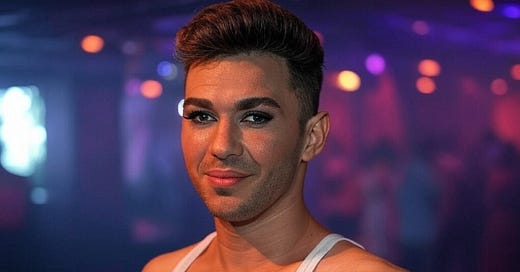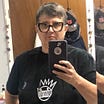I read Stonewall last year. David Carter’s book is a meticulous account of what really happened that night in 1969, and it makes it abundantly clear—Marsha P. Johnson was a drag queen, not a transsexual. Johnson said so himself. But today, you wouldn’t know it if you only listened to the activists, the sanitized Netflix documentaries, and the politically correct retellings that strip away the truth and replace it with ideology.
This isn’t just happening to Marsha. It’s happening to anyone from the past who doesn’t fit neatly into today’s version of identity politics. And I’ve seen it happen to people like Billy—people who were unapologetically gay, who never saw themselves as anything else, but who, if they were alive today, would be rewritten, co-opted, and absorbed into a movement that erases what it meant to be gay in the first place.
Billy Butterfly: The Gay Man They’d Call Trans Today
I met Billy Butterfly when I was 22, waiting tables together in Birmingham—the gay center of Alabama. Back then, I was still calling myself bi, still figuring things out, still dipping my pinky toe into gay culture. Billy, on the other hand, had it all figured out.
Billy was a gay man. He wore eyeliner, he was flamboyant, and he had a sharp, biting wit that could cut through any bullshit. We worked our shifts together, went to the gay clubs after, and smoked a lot of grass. We dropped acid a few times along the way, dancing under neon lights, laughing at the absurdity of it all.
Billy was one of the first gay people I ever really knew, other than myself. He taught me about the culture, about what it meant to be part of something bigger than just who you slept with. And he was not transgender. Not by a long shot.
But I know exactly what would happen to Billy today. He would be labeled “nonbinary” or “transfemme” or some other new term that didn’t exist when he was alive. His effeminacy, his love of makeup, his refusal to conform to traditional masculinity—activists today would say that meant he was never really a man to begin with. They would erase him, just like they’ve erased Marsha P. Johnson, just like they’re erasing countless gay men from history.
How They Rewrite the Past
Billy died in the early 2000s. AIDS took him, like it took so many others. He’s remembered on the quilt, but in small-town Alabama, where he’s buried, most of his family told people he died of cancer. That was how it was back then—so much shame, so much silence. Families didn’t want to admit the truth, so they rewrote it.
And now, decades later, there’s a new kind of rewriting happening.
I see it in the way Marsha P. Johnson has been posthumously transformed from a drag queen into a “Black trans woman.” In the way Stormé DeLarverie, a butch lesbian who fought at Stonewall, is now being called a “trans man.” In the way Billy Tipton, a jazz musician who lived as a man for career reasons, is now labeled transgender, even though he never described himself that way.
It’s the same thing with Joan of Arc—a teenage girl who dressed as a man to fight for her country, now claimed as a “trans icon” by activists who have no respect for history. Joan was a Catholic girl who believed she was carrying out God’s will. She never called herself a man. But the past is no longer safe from the present.
Why This Matters
This isn’t just about words. This is about erasing what it actually meant to be gay, to be a butch lesbian, to be a feminine gay man, to be someone who didn’t fit but still knew exactly who they were. It’s a way of saying that simply being gender nonconforming isn’t enough—that the only way to be “valid” is to claim some kind of trans identity.
But that’s a lie.
Billy wasn’t a woman. Marsha wasn’t trans. Joan wasn’t a man. These people lived as they lived, and their struggles, their joys, their realities should be remembered as they were—not rewritten to fit an agenda they never knew.
I think about Billy a lot. I think about what he’d say if he saw what’s happening now. I think he’d roll his eyes, light a cigarette, and say something cutting but hilarious, something that would leave everyone speechless before throwing his head back in laughter.
But I also think he’d be angry. Because he was proud of who he was. And that’s all any of us ever really wanted.








I think about my friend often. Watching someone you love die of AIDS is terrible.
Leanne, this is a really important topic. The erasure of gay and lesbian history and people in order to exploit them for transgender propaganda is infuriating.
Another remarkable woman I include in the list of misappropriated lesbians is Pauli Murray, a masculine presenting lesbian who, among many other accomplishments, was one of the founders of the National Organization for Women.
https://thevelvetchronicle.com/grave-robbers-declare-pauli-murray-was-not-a-woman/
Where would trans ideology be today without the pioneering gays and lesbians who came before, who are now exploited for a purpose we never intended?
I do have a question, in all sincerity. I knew about Billy Tipton. When she died it was newsworthy in the lesbian community. But why do you refer to Billy as a "he"? To me, she's a female transvestite, a butch lesbian, a woman who passed. I knew many such women. They spoke about the tricky inner dichotomy they felt. Because of the burgeoning intersection between lesbianism and feminism in the 1970s, the butch lesbians I knew came to accept that they were, in fact, women, without changing a thing about their self-presentation. For some of those butches, embracing the fact that they were female was a profound step towards personal integration and a huge weight off their shoulders.
During her lifetime, Billy Tipton preserved the identity she had crafted so she could work as a jazz musician, and probably because she was more comfortable in men's clothes. There may also have been shame and internalized homophobia, which would make sense at the time. The culture was very homophobic, and passing as a man made her work life viable and also increased her chances of finding a woman to love her (there were many).
When she died there was speculation that her death was at least partially due to the physical and emotional stresses of hiding her identity from her lovers, her co-workers, especially the doctors, and even her kids.
This article describes some of the stresses she was under as the result of hiding her sex in her personal relationships and her working life:
https://www.straightdope.com/21342213/what-s-the-story-on-the-female-jazz-musician-who-lived-as-a-man
But today, in the 21st century, is it necessary to perpetuate the transgender myth that being a masculine woman, or even "identifying" as a man, makes a woman a "he"? Billy is no longer here to give us her opinion, but it's my opinion that the closet door is wide open and thankfully, we can say what's true.
I'd love to hear your POV, if you care to share it. Thank you!